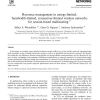Free Online Productivity Tools
i2Speak
i2Symbol
i2OCR
iTex2Img
iWeb2Print
iWeb2Shot
i2Type
iPdf2Split
iPdf2Merge
i2Bopomofo
i2Arabic
i2Style
i2Image
i2PDF
iLatex2Rtf
Sci2ools
134
click to vote
CN
2002
2002
Resource management in energy-limited, bandwidth-limited, transceiver-limited wireless networks for session-based multicasting
In this paper we consider source-initiated multicast session traffic in an ad hoc wireless network, operating under hard constraints on the available transmission energy as well as on bandwidth and transceiver resources. We describe the similarities and differences between energy-limited and energy-efficient communications, and we illustrate the impact of these overlapping (and sometimes conflicting) considerations on network operation. In energy-limited applications, fundamental objectives include the maximization of a network's useful lifetime and the maximization of traffic that is delivered during this lifetime. We demonstrate how the incorporation of residual energy into the cost metric used for tree construction can provide improved performance based on these criteria.
| Added | 17 Dec 2010 |
| Updated | 17 Dec 2010 |
| Type | Journal |
| Year | 2002 |
| Where | CN |
| Authors | Jeffrey E. Wieselthier, Gam D. Nguyen, Anthony Ephremides |
Comments (0)

